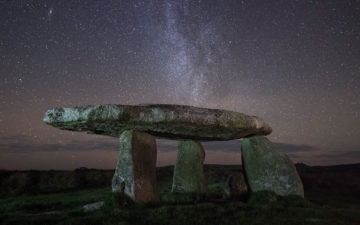 Ian Hesketh in Aeon:
Ian Hesketh in Aeon:
Big History burst on to the scene 30 years ago, promising to reinvigorate a stale and overspecialised academic discipline by situating the human past within a holistic account at a cosmic scale. The goal was to produce a story of life that could be discerned by synthesising cosmology, geology, evolutionary biology, archaeology and anthropology. This universal story, in turn, would provide students with a basic framework for their subsequent studies – and for life itself. Big History also promised to fill the existential void left by the ostensible erosion of religious beliefs. Three decades later, it’s time to take a look at how Big History has fared.
David Christian first made the case for what he called ‘Big History’ in an article in the Journal of World History in 1991. He based it on an interdisciplinary course that he had been teaching at Macquarie University in Sydney that brought together faculty members from the sciences and the humanities. The idea for the course was to situate human history within a grand historical narrative that stretched backwards in time to the origins of the cosmos in the Big Bang and forwards to include the present and future development of the human species. The course promised to transform the way students were taught history by focusing on the big picture and what united all humans rather than what divided them.
At the time, Christian was reacting to a trend in academic life towards increasing specialisation. This trend played a role in further dividing the ‘two cultures’ of knowledge represented by the arts and sciences, but also led to divisions within those two cultures as well. Christian’s discipline of history, for instance, had grown fragmented into geographic and temporal specialisations, while narrow studies of archival sources were preferred to large-scale narratives that were more common earlier in the century. At a time when, in Jean-François Lyotard’s memorable phrase from 1979, an ‘incredulity towards metanarratives’ represented the era’s postmodern condition, Christian headed in the opposite direction.
More here.
